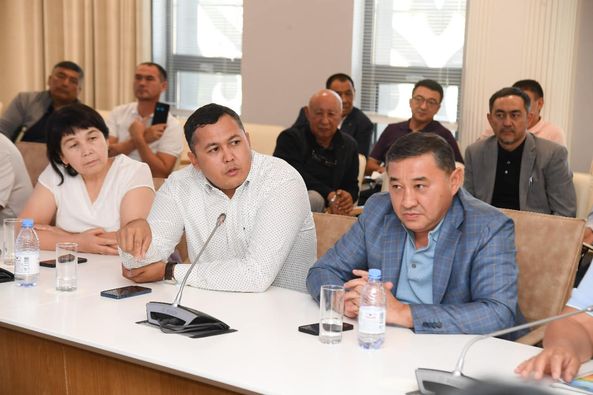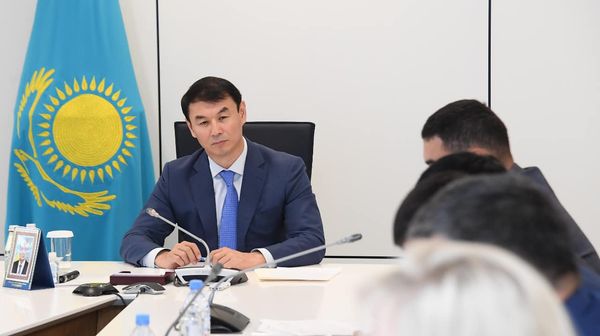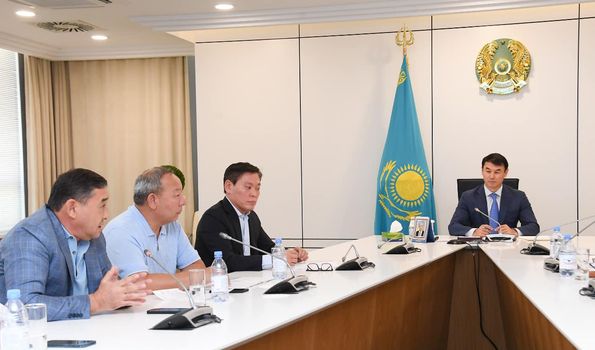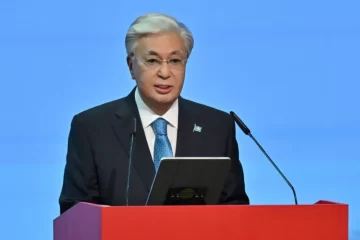ТУРКЕСТАН: ДАРХАН САТЫБАЛДЫ ВСТРЕТИЛСЯ С РУКОВОДИТЕЛЯМИ ХЛОПКОЗАВОДОВ

Для доведения всех требований местных аграриев аким Туркестанской области Дархан Сатыбалды встретился с руководителями хлопкоперерабатывающих заводов региона и международными торговцами хлопком (трейдерами, покупающими хлопок). В ходе открытой беседы были обсуждены актуальные вопросы в сфере хлопкоробства, внесены соответствующие предложения со стороны акимата области. Аким области отметил ряд требований к руководителям заводов.
— Мы с вами специально встретились, чтобы обсудить важный вопрос и прийти к общему решению. Во время встреч с крестьянами они говорили о ряде проблем в области хлопководства. Сразу скажу, что мы — на стороне народа. Я согласен с требованиями людей, но и вас мы понимаем. Прошу подумать о положении дехкан. Крестьяне не согласны с низкими ценами, выращенное в этом году. Они говорили и об обмане на весах в хлопкоприемных пунктах, а также о том, что лаборатории намеренно снижают качество хлопка. Такого не должно быть. А вообще, на будущее я бы рекомендовал вам заниматься не только очисткой и продажей хлопка, но и его переработкой. Если откроются швейные фабрики, многие проблемы будут решены. И крестьянам выгодно, и внутренний рынок будет расти. Также будут открыты новые рабочие места. Если вы возьметесь за это дело, мы готовы поддержать, — сказал Дархан Сатыбалды.
Глава области предложил владельцам крупных заводов заниматься переработкой хлопка, а не только его очисткой. Стороны обсудили общие вопросы, в результате чего с сегодняшнего дня аграриям будет произведена предоплата (аванс) в размере 250 тысяч тенге за тонну хлопка-сырца. Окончательная цена будет зависеть от биржи.
Отметим, стоимость реализации хлопка-сырца находится в прямой зависимости от цены хлопка-волокна на мировом рынке и устанавливается в соответствии с индексом Ливерпульской биржи. В регионе 21 хлопкоперерабатывающий завод имеет более 200 хлопкоприемных пунктов.
Сегодня хлопкопромышленные компании работают непосредственно с международными торговцами хлопком (трейдерами). Трейдеры заключают предварительные договоры на покупку хлопка-волокна и финансируют их. Поэтому практически все средства, необходимые для приобретения хлопка в сыром виде, являются частными инвестициями. Руководители хлопкозаводов, пришедшие на встречу, заявили, что на данный момент спроса нет, и заявили, что цена зависит от качества хлопка.
В целом в этом году в области засеяно более 125 тысяч га хлопчатника. Это 15% от всей посевной площади. Предполагается, что урожайность хлопка-сырца составит более 330 тысяч тонн по 26,2 центнера с гектара. На сегодняшний день в области собрано 16 тысяч тонн хлопка. Его сбор продолжается. Всего в этой сфере трудятся более 25 тысяч агроформирований.
В прошлом году тонна хлопка-сырца в среднем составляла 320-380 тысяч тенге. В Россию, Китай, Турцию, Латвию, Молдову, Беларусь, Германию, Бельгию было экспортировано 68 тысяч тонн хлопкового волокна. Остальные 19 тысяч тонн были проданы на внутренний рынок. Это, в свою очередь, положительно сказалось на улучшении социально-экономического положения агроформирований, занимающихся хлопководством.
Напомним, на осенние уборочные работы государство выделело 48 тысяч тонн ГСМ (цена на 15-20% ниже рыночной) и произведено субсидирование 50% стоимости 522-х различных минеральных удобрений. На это из бюджета выделено 6 млрд тенге. Кроме того, на субсидирование стоимости пестицидов и биопрепаратов, применяемых против 653 различных вредителей и болезней растений, выделено 521,4 млн тенге, а на удешевления стоимости приобретенных агроформированиями семян предусмотрено 600 млн тенге.

Пресс-служба акима Туркестанской области
__
TURKESTAN: DARKHAN SATYBALDY MET WITH THE HEADS OF COTTON MILLS
To bring all the requirements of local farmers, akim of Turkestan region Darkhan Satybaldy met with the heads of cotton processing plants in the region and international cotton traders (traders buying cotton). During the open conversation, topical issues in the field of cotton growing were discussed, relevant proposals were made by the akimat of the region. Akim of the region noted a number of requirements for plant managers.
— We have met with you specifically to discuss an important issue and come to a common solution. During meetings with peasants, they talked about a number of problems in the field of cotton growing. I must say right away that we are on the side of the people. I agree with the demands of the people, but we understand you too. Please think about the situation of the dehkans. Farmers do not agree with the low prices grown this year. They also talked about cheating on the scales at cotton receiving points, as well as that laboratories deliberately reduce the quality of cotton. This should not be. In general, for the future, I would recommend that you not only clean and sell cotton, but also process it. If garment factories open, many problems will be solved. And it is profitable for the peasants, and the domestic market will grow. New jobs will also be opened. If you take up this case, we are ready to support you,» Darkhan Satybaldy said.
The head of the region suggested that the owners of large factories should be engaged in processing cotton, and not just cleaning it. The parties discussed general issues, as a result of which, starting today, farmers will receive an advance payment (advance payment) in the amount of 250 thousand tenge per ton of raw cotton. The final price will depend on the exchange.
It should be noted that the cost of selling raw cotton is directly dependent on the price of cotton fiber on the world market and is set in accordance with the index of the Liverpool Stock Exchange. There are 21 cotton processing plants in the region with more than 200 cotton receiving points.
Today, cotton companies work directly with international cotton traders (traders). Traders conclude preliminary contracts for the purchase of cotton fiber and finance them. Therefore, almost all the funds needed to purchase raw cotton are private investments. The heads of cotton mills who came to the meeting said that there is no demand at the moment, and said that the price depends on the quality of cotton.
In general, more than 125 thousand hectares of cotton have been sown in the region this year. This is 15% of the total sown area. It is assumed that the yield of raw cotton will be more than 330 thousand tons at 26.2 quintals per hectare. To date, 16 thousand tons of cotton have been harvested in the region. Its collection continues. In total, more than 25 thousand agro-formations work in this area.
Last year, a ton of raw cotton averaged 320-380 thousand tenge. In Russia, China, Turkey, Latvia, Moldova, Belarus, Germany, Belgium it was exported to 68 thousand tons of cotton fiber. The remaining 19 thousand tons were sold to the domestic market. This, in turn, had a positive impact on the improvement of the socio-economic situation of agro-formations engaged in cotton growing.
Recall that the state allocated 48 thousand tons of fuel for autumn harvesting (the price is 15-20% lower than the market price) and subsidized 50% of the cost of 522 different mineral fertilizers. 6 billion tenge has been allocated from the budget for this. In addition, 521.4 million tenge was allocated to subsidize the cost of pesticides and biological products used against 653 different pests and plant diseases, and 600 million tenge was provided for reducing the cost of seeds purchased by agroformations.

Press service of the akim of Turkestan region









